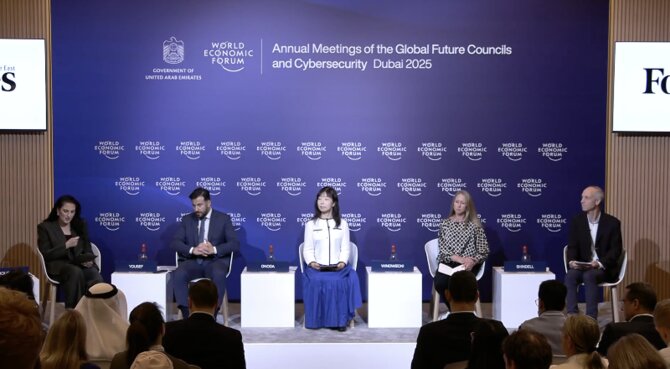WEF Panel Highlights Innovation and Global Cooperation as Pathways to Restore Planetary Balance
Dubai – At the World Economic Forum’s Annual Meeting of the Global Future Councils on Cybersecurity in Dubai, experts highlighted the transformative potential of emerging technologies to strengthen the Earth’s resilience and restore ecological balance.
While a recent WEF report notes that humanity has crossed seven of the nine planetary boundaries, the discussion emphasized that innovation, collaboration, and sustainable practices can help reverse environmental damage and secure a thriving future for the planet.
A session titled “Emerging Technologies for the Planet” showcased pioneering solutions from around the world. Experts explored how advances in green construction materials, precision fermentation, and lab-grown proteins can reduce ecological pressures, support sustainable food systems, and create new avenues for economic growth.
These technologies demonstrate that scientific innovation, when combined with policy and global partnerships, can play a key role in maintaining the Earth’s stability.
Prof. Drew Shindell of Duke University stressed the importance of addressing methane emissions, a major contributor to global warming. He highlighted that reducing methane not only mitigates climate change but also protects forest ecosystems and enhances air quality.
Shindell emphasized that while industrial emissions are measurable and manageable, the agricultural sector offers significant opportunities for innovation through novel techniques and sustainable practices.
He called for stronger public-private partnerships to scale these solutions worldwide, demonstrating that global cooperation can accelerate progress.
Dr. Leigh Ann Winowiecki, global research lead for Soil and Land Health at CIFOR-ICRAF, highlighted the critical role of soil in sustaining life. Healthy soil is vital for food security, water regulation, carbon storage, and biodiversity.
She noted that technological advancements have revolutionized the study of underground ecosystems, enabling scientists to better understand and manage soil health.
“We just launched the first ever Global Future Council on Soil and Land Health,” she said, emphasizing that these tools allow for unprecedented insight and actionable solutions for sustainable agriculture.
Masami Onoda, director of the Japan Aerospace Exploration Agency’s International Relations and Research Department, discussed the role of satellite observation in monitoring the planet.
She highlighted that satellites provide massive amounts of real-time data, enhancing our understanding of ecosystems and enabling timely interventions.
This technology allows scientists, policymakers, and industries to make informed decisions that support environmental sustainability while fostering global cooperation.
Yousef Yousef, CEO and environmental innovation leader in water technology, emphasized the importance of scaling new technologies to maximize their impact.
He shared an example of ultrasound technology used to manage algae on water surfaces, noting that it took five years to expand from pilot research to deployment in 67 countries.
“Once you scale the technology, you can create the impact,” he said, illustrating how innovation can be translated into meaningful global solutions.
The panel also underscored the role of international collaboration in driving positive change. By combining scientific expertise, technological innovation, and strategic partnerships, countries and organizations can address complex environmental challenges efficiently.
Experts agreed that solutions must be inclusive, scalable, and adaptable to local contexts to ensure long-term success.
As the discussion concluded, speakers expressed optimism about the opportunities technology provides for restoring planetary health.
They emphasized that although humanity has pushed the Earth’s systems beyond traditional safe limits, coordinated innovation and global action can reverse damage, improve resilience, and safeguard ecosystems for future generations.
The session in Dubai demonstrated that the intersection of science, technology, and international cooperation holds immense promise.
By embracing these solutions, humanity has the potential not only to stabilize the environment but also to create sustainable pathways for economic development, food security, and climate resilience.
Through continued investment in research, scalable technologies, and cross-border partnerships, the global community can achieve a balanced, thriving, and resilient planet.
This optimistic approach positions innovation as a catalyst for environmental restoration and long-term sustainability.



